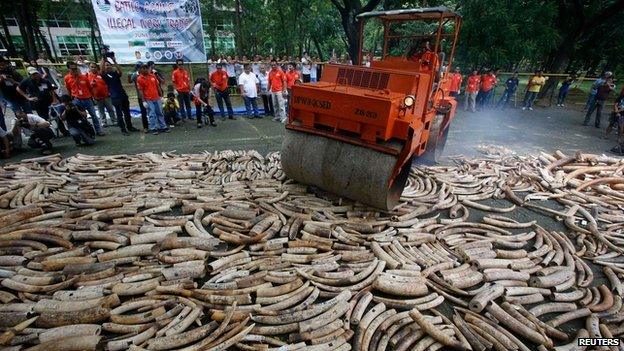Declaration signed on illegal wildlife trade
- Published

Some organisations want to have all ivory sales banned and stockpiles destroyed
Governments from around the world have vowed to take action on the illegal trade in wildlife.
At the conference at Lancaster House in London, delegates from 46 different countries and 11 UN organisations have signed The London Declaration.
This outlines the steps that need to be taken to stop animal poaching, which governments agreed needs to be treated as a serious crime.
The illegal trade in wildlife is worth about $19bn dollars a year.
The London declaration states that investigating the links to corruption and organised crime needs to be made a priority.
The 46 countries have also committed to improving cross border cooperation - and to strengthening laws and policing.
With tens of thousands of rhinos, elephants and tigers being killed each year, these species face a real risk of extinction.
The bulk of poaching takes place in Africa, but much of the demand comes from Asia, where animal products, such as rhino horns, are used in traditional medicine or are bought by the rich as trophies.
Speaking at the conference, the UK's Foreign Secretary William Hague said: "The illegal wildlife trade is a global problem and it matters deeply to all of us gathered here today.
"We need to show the world our political commitment at the highest level across the globe to addressing this before it is to late."
Actions from the meeting include:
Treat wildlife trade as a serious crime within the UN convention against transnational organised crime
Address problems of corruption and money laundering related to wildlife crime with legislation - a zero tolerance policy
Strengthen legal frameworks and help law enforcement
Better cross-agency mechanisms to deal with wildlife crime
Endorsing governments which are destroying wildlife products
Renounce governments which use products from species threatened with extinction
Conservationists broadly welcomed the news, but they say action will be need to be taken quickly.
Heather Sohl, chief species adviser at WWF-UK, said: "Governments signing the London Declaration today sent a strong message: Wildlife crime is a serious crime and it must be stopped.
"This trafficking devastates species populations, but also takes the lives of rangers, impedes countries' economic development and destabilises society by driving corruption."
Dr John G Robinson, chief conservationist at the Wildlife Conservation Society, said the illegal trade involved "well-financed and well-armed syndicates".
He commented: "The declaration calls for governments to crack down on these criminals with stiffer penalties and more aggressive investigation and prosecution, including addressing the corruption and bribery that facilitate these crimes.
"It further calls for addressing this crisis at all points of the supply chain - where the animal is killed, where the parts are trafficked, and where the products are purchased."
Prince Charles and The Duke of Cambridge, Prince William, attended the meeting, hosted by the UK government.
The conference heard from the presidents of Botswana, Chad, Gabon and Tanzania, and the foreign minister of Ethiopia.
President Khama of Botswana said that he would put the country's ivory stockpiles out of reach of the markets.
As an additional pledge, the leaders of Botswana, Chad, Gabon and Tanzania have agreed to a moratorium on the ivory trade for at least 10 years, as part of an elephant protection initiative.
While the trade of ivory has been banned under CITES (the Convention on International Trade in Endangered Species of Wild Fauna and Flora) since 1989, some states have been granted permission to sell their ivory stocks in the past.
In 1999, CITES authorised a "one-off" sale of stockpiled ivory from Zimbabwe, Botswana and Namibia to Japan, and in 2008 Namibia, Botswana, South Africa and Zimbabwe sold their stocks to buyers in China and Japan.
In essence, by issuing a 10-year moratorium, the four African states are saying they will uphold the ban, and not ask for permission from CITES to sell any of their ivory.
Follow Rebecca on Twitter, external
- Published11 February 2014
- Published12 February 2014
- Published9 February 2014